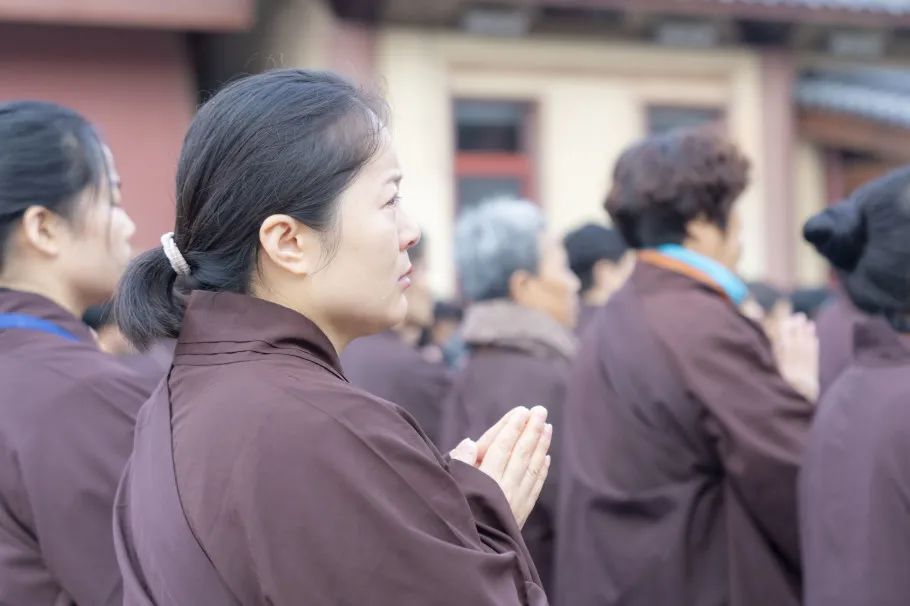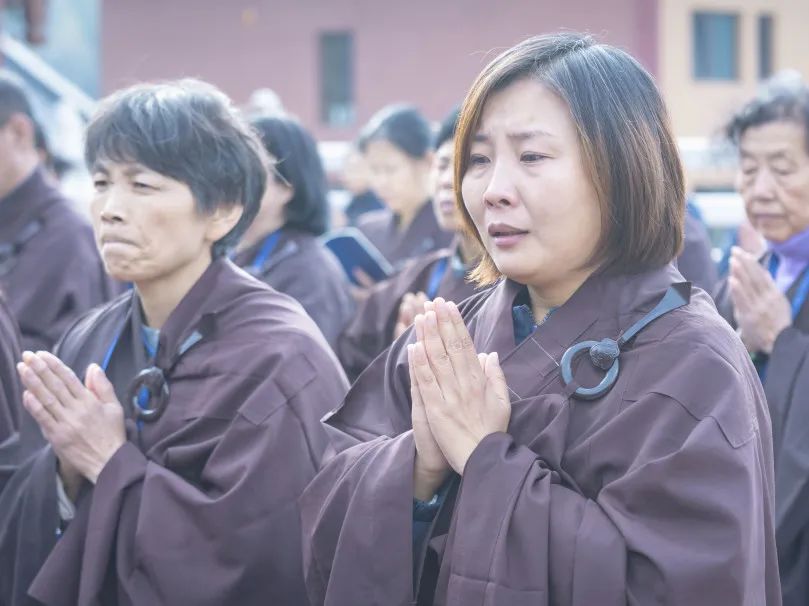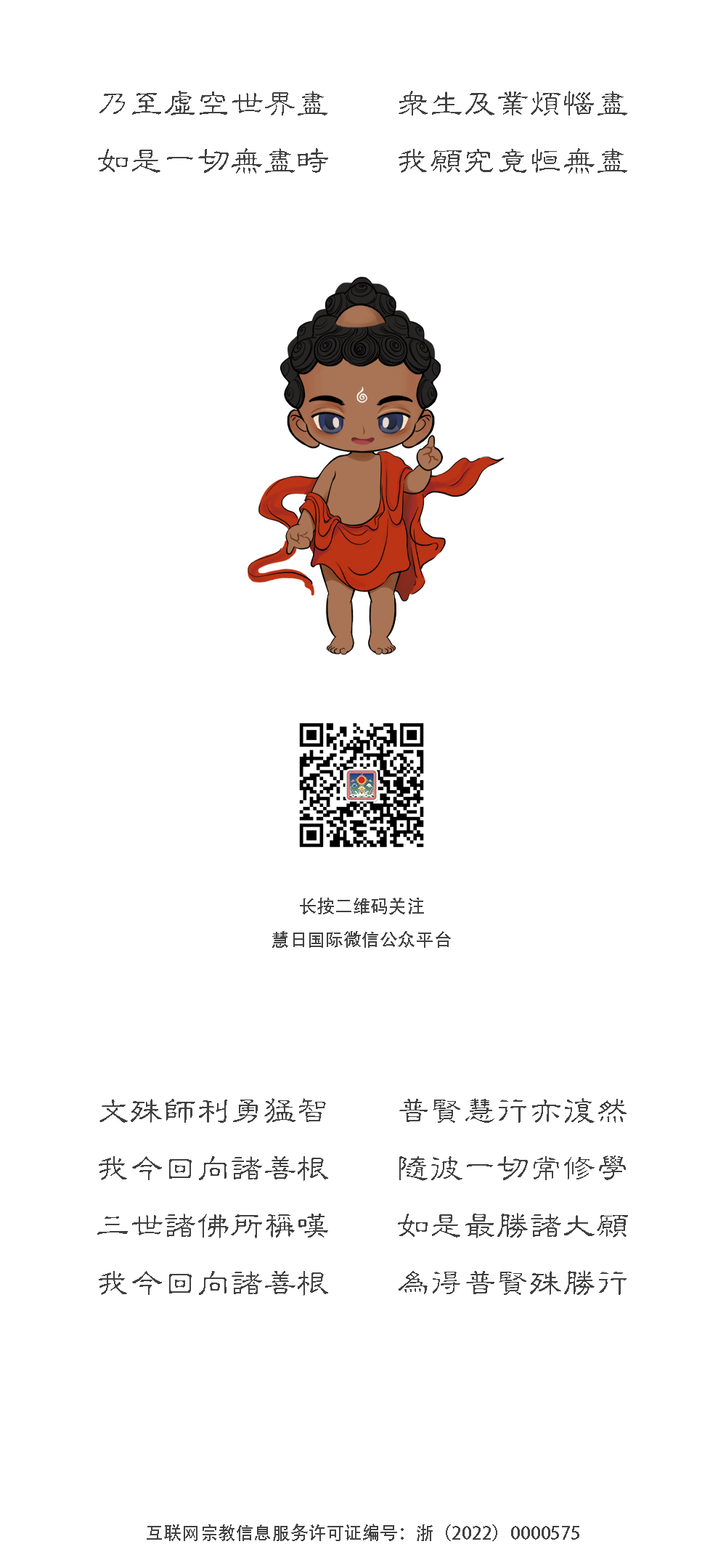“我愿意”许下生命的承诺和愿望---详解“三皈五戒”


我们皈依时常念:
南无大乘常住三宝!
When we take refuge, we often recite:
“Namo Mahayana, Ever-Abiding Triple Gem!”
“大乘”,
代表我们所有人、
所有的生命
都可以纳入这个体系当中来。
这个体系是一个“火车”、“大轮船”,
可以装乘很多很多的人。
“Mahayana” represents a universal inclusiveness—
all beings, all forms of life can be embraced within this system.
This system is like a “train” or a “great ship,”
capable of carrying countless beings.
“常住”,
地球在旋转,四季更迭,
二十四节气轮转,不断生灭,
但有一种真理在宇宙间是常住的。
“Ever-abiding” signifies an eternal truth:
while the Earth rotates, seasons change,
and the twenty-four solar terms cycle through birth and decay,
there exists a truth in the universe that is unchanging and everlasting.
“三宝”是佛法僧,
皈依佛法僧三宝,
成为佛弟子,
代表我们的生命
已从低级的状态向高级的方向发展,
代表我们的生命开始苏醒。
The “Triple Gem” refers to the Buddha, the Dharma, and the Sangha.
Taking refuge in the Triple Gem
and becoming a disciple of the Buddha
symbolizes a transformation in our lives:
from a lower state of being toward a higher one.
It signifies the awakening of our very existence.

仁
仁、义、礼、智、信
Benevolence,
Righteousness,
Propriety, Wisdom,
and Trustworthiness
孔老夫子讲“仁、义、礼、智、信”,这是我们做人的基本标准。佛教把这个理论具体成为一种行为,就是戒。
“仁”表现在尊重生命,即不杀生戒。尊重生命我们就会健康长寿。
“义”表现的行为就是不偷盗,不偷盗我们的财富就会有效地积累。
"礼"就是尊重,特别表现在夫妻关系上就是不邪淫,不找第三者,这样我们家庭就会和睦。
“智”表现在不饮酒,始终保持理性的状态和思维,才会做出正确的抉择。
“信”表现在不妄语,人的信誉要靠不妄语来建立。
这五条戒是“仁义礼智信”的保障和具体实践,也是作为佛教徒的我们的一个行为准则。
LOVE GINKGO TREES

LOVE THE LEAVES

『三皈五戒--佛弟子的行为准则』

五戒是佛自己做到的,我们的历代先贤列祖里,有智慧的人也都这样践行,今天传承到我们,就像下载软件一样,如果我们也愿意这样去实践,就跟诸佛菩萨、跟我们的祖先、跟一切圣贤连接在一起。
The Five Precepts are principles upheld by the Buddha himself, and throughout history, great saints, wise sages and ancestors have practiced them. Passed down to us today, they are like a software we can download and apply. Should we be willing to practice them, we connect ourselves with all Buddhas, Bodhisattvas, our ancestors, and the great saints and sages.
三皈依是我们成为佛弟子的一个小的仪式,是一个愿望,是一种承诺,代表我们“愿意”成为佛弟子了。五戒就是除了愿望之外的具体实践,具体的行为准则。三皈五戒对于佛弟子来说,就意味着我除了有这样的信仰,我也有这样子的行为准则。
Taking the Three refuges is a small ceremony—an expression of a wish and a commitment to becoming a disciple of the Buddha, symbolizing our willingness to embrace this spiritual path. The Five Precepts go beyond the intention; they are the practical application, forming a concrete code of conduct. Together, the Three Refuges and Five Precepts signify that, as a Buddhist disciple, one not only holds faith but also adheres to such code of conduct in daily life.


『五戒,能持否?能持!』

五条戒可以一起受,也可以受四条、三条、两条乃至一条都可以。五条里面你至少可以做到一条。师父在问你的时候,你能做到哪一条就回答“能持”,如果觉得做不到,可以默默地不用答应。这一问一答的过程看似很简单,实际上是不容易的。世间首先要有出家人,要能够有这个传承。
五戒就像国家的宪法,宪法是国家最基本的保障,这五条戒就是我们每个人的宪法,是我们要遵守的最基本的戒律。受戒持戒的人,就不会堕落三恶道,不仅自己不堕落,而且对于堕落的众生我们还能拯救他。就像你赚了钱就不会饿肚子,不单你不会饿肚子,你可以让乞丐不饿肚子,给他买东西吃。这个功德力不单能保护我们自己,也能保护我们的爸爸妈妈,保护祖先乃至护佑我们的子孙。

翻译:妙莲(新加坡)
朗诵:贤淑
-END-




